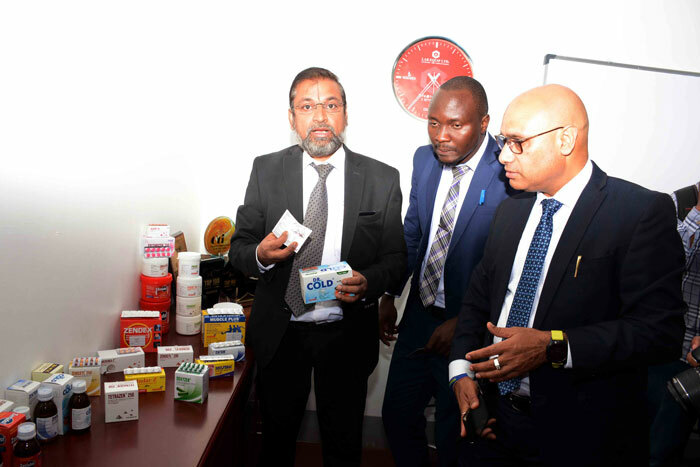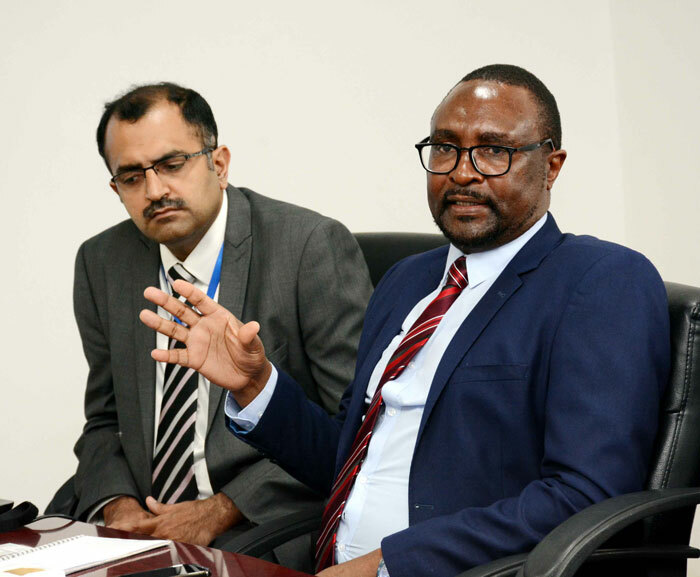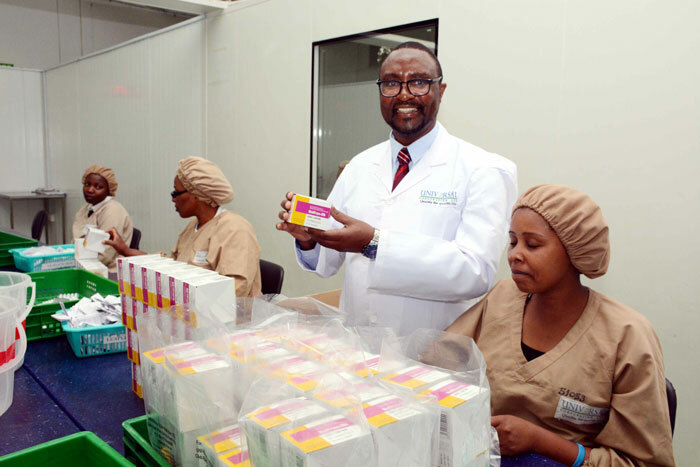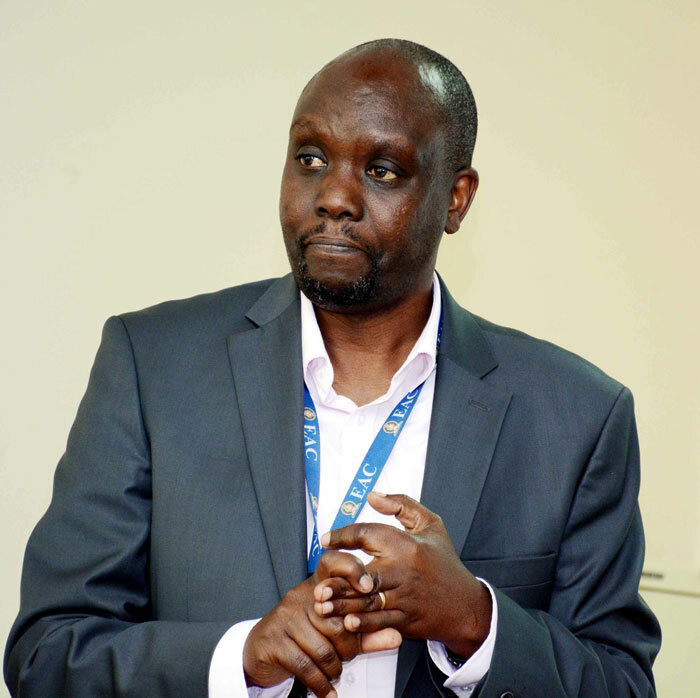From BUBU to BEBE, which way for East Africa?
Wesley Ronoh, a pharmaceutical expert working with the EAC secretariat in Arusha said that most local pharmaceutical manufacturers were producing below capacity because of cheap drugs from China and India.
Gopi Yanomada (left) the general manager in charge of operations at Zenufa Labaratories Limited in Tanzania, with Andrews Mgimba, the quality head and mnaging director, Hitesh Upreti (right) show some of the medicines they manufacture a te factory located in Dar es Salaam, Sept 26,2018. Photo by Eddie Ssejjoba
There is a growing concern among East African Community (EAC) pharmaceutical manufacturers over the uncontrolled importation of cheap medicines from more developed countries into the region, which has largely affected the local industry and created unfavorable competition in the local market.
Although the EAC secretariat has been supporting the local industries in the region, importation of ingredients (inputs), high labor costs and lack of incentives from respective governments were putting pharmaceutical industries at a disadvantage, competing with imported products that enjoy huge support from their respective countries.

Hitesh Upret, the managing director Zenufa Laboratories Limited located in Dar es Salaam in Tanzanian said that they face stiff competition in the EAC market due to cheap imported drugs compared to the locally manufactured drugs because they import at least 80% of inputs.
He said that governments in the region should copy from their counterparts in developed countries and offer incentives and tax waivers to local manufacturers, which give employment to many people.

Dr. George Mugi, the quality services and regulatory affairs manager explains to journalists challenges they face in manufacturing drugs at Universal Corporation Limited factory in Kikuyu, Kenya, September 28, 2018.
He said the local industry is bogged down by high product costs, which he said come from frequent power outages, interruption of work by surprise visits of government agencies, delays in offloading of cargo at ports, taxes on importation of special type of sugar used in the manufacture of syrup, payments for numerous licenses, to mention but a few.
Similar complaints were raised by Universal Corporation Limited (UCL), a pharmaceutical manufacturing company and an affiliate of Strides, based in Kikuyu Township in the outskirts of Nairobi city.
Dr. George Mugi, the company quality services and regulatory affairs manager stated that the Kenyan government was not protecting local manufacturers in addition to imposing a lot of levies.
He said the company employs over 7000 workers both permanent and temporally and said government ought to give them priority when procuring drugs for its agencies because they qualify to supply drugs to the World Health Organization (WHO).

Dr. George Mugi shows some of the products manufactured at Universal Corporation Limited factory in Kikuyu, Kenya
"Governments should give priority to local manufacturers in procuring its medicines instead of opting for cheap products from outside the region," he stated. The company supplies mainly to UNICEF.
He said that although there was goodwill from the regional leaders towards supporting local manufacturers, EAC member states were yet to implement the recent roadmap drawn at Speke Resort in Munyonyo.
"I appeal to the member states to start implementing the roadmap so that citizens can have access to essential medicines," he stated.
He said the plant was still producing at low capacity due to a small market, largely affected by competition from outside the region.
Wesley Ronoh, a pharmaceutical expert working with the EAC secretariat in Arusha said that most local pharmaceutical manufacturers were producing below capacity because of cheap drugs from China and India.
He suggested for EAC states to impose duties on some drugs that are produced locally, which he said would protect local manufacturers.
Cipla Quality Chemicals Limited from Uganda and Kenya's UCL were the only two companies that qualify to supply drugs to WHO and the rest were still struggling.
He however said products manufactured in EAC constitute 66% of disease condition in the region, which is why the EAC secretariat had come out to support the Federation of Pharmaceutical Companies and to fight for the removal of barriers that affect their growth.
He enumerated a number of challenges facing the sector, which he said include lack of skilled manpower from the region to work in the pharmaceutical industries because many graduates from Universities lack the required job skills, but explained that there were arrangements to support the recruit new graduates on internship programs and be retained.

Wesley Ronoah, a regional expert on pharmaceutical sector with the EAC in Arusha, Tanzania
He said the community had arrangements to give incentives to industries to train more young workers.
There were also efforts to fight counterfeits by strengthening market surveillance and strengthen legislative systems.
According to Ronoh, over 50% of pharmaceuticals imports into the EAC come from Asia, particularly from India and China, but some were substandard although they find their way into region.
He said that pharmaceutical imports into the EAC had been rising at a much higher pace than the pharmaceutical exports by local firms, adding that although EAC manufacturing firms increased their capacities it was not in the pace to keep up with demand hence losing out to foreign firms.
He said the secretariat was targeting reversing the dependency on pharmaceutical imports from outside EAC from more than 70% to less than 50% and supporting the expansion of product portfolio of local EAC firms to cater for more than 90% of disease conditions.
"We aim at ensuring that at least 50% of purchases by EAC national medicines procurement agencies is sourced from EAC pharmaceutical manufacturers, so that there is enough support of local industry towards expanding their portfolio," he stated.
Dr. Thomas Walter, a senior advisor to the EAC however said that the matter should be handled at Presidents' level, where the various head of states should always make pronouncements on helping the regional manufacturing sector to realize growth.
He also advised states like Uganda to drop their Buy Uganda Build Uganda (BUBU) strategy and instead promote Buy East Africa, Build East Africa (BEBE) strategy for the EAC spirit and grow together as one block.